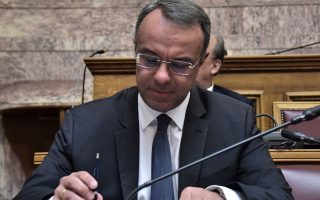Analysts view draft budget as ‘optimistic’

The draft 2023 budget submitted to Parliament last week is described as “a little optimistic” by the economists of international firms who spoke to Kathimerini, as the uncertain environment due to the energy crisis, geopolitical instability and the possibility of a severe recession in the eurozone creates challenges for the assumptions of the Greek government on the growth and fiscal fronts and especially on the investment front.
The draft 2023 budget submitted to the Parliament last week is described as “a little optimistic” by the economists of international firms who spoke to Kathimerini, as the uncertain environment due to the energy crisis, geopolitical instability and the possible severe recession in the eurozone creates challenges for the assumptions of the Greek government on the growth and fiscal fronts and especially on the investment front.
“The commitment of the government to achieve primary surplus next year remains. Although whether these projections are realistic or not depend not only on the willingness of the Greek government, but on several other factors that could lead to a more substantial slowdown in economic activity next year resulting in lower tax revenues and/or in other factors that affect the projected expenditures, as for example higher energy prices,” says Spyridoula Tzima Vice President for Global Sovereign Ratings at DBRS Morningstar.
The rating agency views Greece’s commitment to fiscal adjustment positively, but “at the same time we note that risks are elevated. We think that repairing the fiscal accounts is a positive step. Among other things, it boosts investors’ confidence, which is important, especially in a period of rising interest rates. At same time, maintaining a fiscal policy mix that is not a hurdle to growth is also important.”
The Greek government’s forecasts for growth of 2.1% are higher than those of most houses, while some do not rule out the possibility that Greece will enter a recession. At the same time, the revision of the primary surplus to 0.7% of GDP, from 1.1% before, is on the right track, they point out, although the target is still difficult to achieve given the international environment.
“Despite the budget objective for 2023 has been lowered since last time, we believe that the target of a primary budget surplus are still a bit optimistic. This is mainly due to the underlying assumptions about the Greek economy,” argues Paolo Grignani, senior economist at Oxford Economics.
“The government is still expecting a positive growth in 2023, while we are expecting a small contraction of GDP because of the ongoing energy crisis, higher inflation and interest rates. Moreover, despite large part of government debt is held by international institutions at a favorable rates, the recent increase of long term bond yield may negatively impact public finances by around 0.2-0.4% of GDP. Hence we believe that the fiscal balance will worsen next year, as we expect the government will need to support the economy more heavily than currently expected and to shield the most vulnerable part of the population from the crisis,” he adds.
HSBC believes believes the new primary surplus of 0.7% of GDP is more realistic and closer to its forecast of a small primary deficit (and a 2.8% overall deficit). “Part of the difference is likely to be due to our less optimistic view on the economic outlook, where we have lowered 2023 GDP growth to 2.0%. One risk we see the use of windfall tax receipts thanks to inflation – which are likely to be at least partly temporary in our view – to fund permanent spending increases and tax cuts, which could make it harder to achieve a sustainably high primary fiscal surplus beyond next year,” notes Fabio Balboni, Director-Senior European Economist at HSBC.
For its part, UniCredit expects growth to come to just 0.7%, although, as its economist Tullia Bucco explains, “the meaningful GDP correction I pencilled in at the end of this year contributes to lower next year’s forecast via a negative carry-over effect. I still think that risks to the government’s 2023 GDP forecast are on the downside but, given the uncertainty surrounding GDP forecasts in the current environment, I would not focus too much on yearly averages.”
“More importantly, I do share the view that Greece is likely to avoid recession next year given its lower dependency on Russian gas compared to other eurozone peers. My sequential GDP path (i.e. based on quarter-on-quarter changes) is positive through end-2023. I think that the adjustment is significant given the current environment – the commitment to reach a 1.0% primary surplus was no longer realistic,” says the UniCredit expert.





